Publications

COVID-19 and Food Safety: Guidance for food businesses : interim guidance
06/01/2021
The world is facing an unprecedented threat from the COVID-19 pandemic caused by the SARS-CoV-2 virus (referred to as the COVID-19 virus). The purpose of these guidelines is to highlight additional measures so that the integrity of the food chain is maintained, and that adequate and safe food supplies are...

Mitigating the effects of the COVID-19 pandemic on food and nutrition of schoolchildren
15/03/2021
This joint note from WFP, FAO and UNICEF intends to provide government decision makers, school administrators/staff and partners with preliminary guidance on how to support, transform or adapt school feeding (in the short term) to help safeguard schoolchildren’s food security and nutrition during the COVID-19 pandemic. Specific recommendations are provided...

Food security under the COVID-19 pandemic
18/03/2021
The document highlights the measures to confront the impact of the pandemic. The report points out that the main challenge in the short term is to guarantee the access to food, especially for those who have lost their source of income. The FAO report also recommends CELAC to reactivate its...

Running farmer field schools in times of COVID-19: A resource handbook
23/03/2021
This handbook provides guidance and suggestions to farmer field schools (FFS) facilitators, Master Trainers, project coordinators and rural advisors to run FFS activities and other agricultural trainings in times of COVID-19. It includes basic protective measures, important considerations, proposed FFS activities, links to WHO resources and videos and more. It...

COVID-19 and Food Safety: Guidance for competent authorities responsible for national food safety control systems
24/03/2021
The guidance highlights temporary measures that can be introduced to contain widespread food safety risks and reduce serious disruption to national food safety programmes, aiming to ensure the effectiveness of a reduced food safety inspection programme during COVID-19 pandemic in mitigation the food safety risks.

Exposure of humans or animals to SARS-CoV-2 from wild, livestock, companion and aquatic animals
25/03/2021
Understanding the risk of exposure of humans or animals to SARS-CoV-2 from animals and their products is essential for containing virus spread, prioritizing research, protecting food systems, and informing national One Health investigations and mitigation measures. This Qualitative Exposure Assessment provides a comprehensive review of available scientific evidence and assessment...

Cities and local governments at the forefront in building inclusive and resilient food systems
27/03/2021
The COVID-19 pandemic is disrupting urban food systems worldwide, affecting the food security and nutrition of urban populations. With up to 70% of the global food supply destined for urban consumption, the disruption of urban food systems has particularly affected the food distribution and the food retail sectors. The management...

FAO COVID-19 Response and Recovery Programme - Boosting smallholder resilience for recovery
30/03/2021
The COVID-19 pandemic is having devastating short- and long-term impacts on the lives and livelihoods of people in rural, peri-urban and urban settings. Apart from the pandemic’s toll on human health and everyday life, containment measures, particulary the restricted movement of people and goods, are resulting in a dramatic increase...

SARS-CoV-2 in animals used for fur farming. GLEWS+ Risk assessment (20 January 2021)
09/04/2021
This Tripartite Risk Assessment, as a joint effort under the GLEWS+ initiative, evaluates the risk of introduction and spread of SARS-CoV-2 within fur farming systems as well as whether farmed fur animals could play a significant role in the spread of SARS-CoV-2 to humans via spillover. Additionally, using a One...
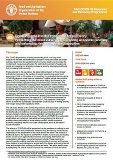
Stimuler la résilience des petits producteurs en vue d’un redressement
21/01/2020
Protéger les plus vulnérables, promouvoir la relance économique et accroître les capacités de gestion des risques.
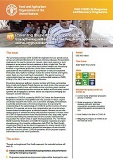
Prévenir la prochaine pandémie zoonotique
21/01/2020
Renforcer et élargir l’approche «Une seule santé» pour conjurer les pandémies d’origine animale.
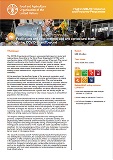
Normes commerciales et de sécurité sanitaire des aliments
21/01/2020
Facilitation et accélération du commerce de produits agricoles et alimentaires durant la pandémie de COVID-19 et au-delà.
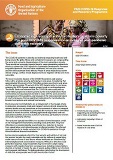
Inclusion économique et protection sociale pour réduire la pauvreté
21/01/2020
Réponses à la covid-19 en faveur des pauvres pour une relance économique inclusive après la pandémie.
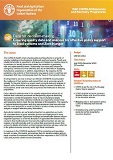
Données pour la prise de décisions
21/01/2020
Garantir des données et une analyse de qualité pour des politiques efficaces de soutien aux systèmes alimentaires et à l’opération «Faim zéro».
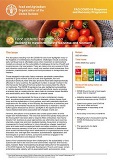
Transformation des systèmes alimentaires
21/01/2020
Reconstruire pour transformer durant la phase de réponse et de redressement.

Plan de réponse humanitaire global
21/01/2020
S’attaquer aux effets de la covid-19 et sauvegarder les moyens d’existence dans des contextes de crise alimentaire.
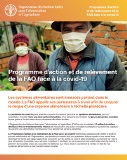
Programme d’action et de relèvement de la FAO face à la covid-19
21/01/2020
La pandémie de covid-19 porte atteinte à la santé humaine et perturbe les systèmes alimentaires, qui sont essentiels à la santé.
